As Diplomacy Intensifies Ahead of London Talks, Russian Missiles Strike Cities, Kremlin Officials Blame Ukraine for Ceasefire Failures, and Global Allies Reposition for Negotiations
Summary of the Day – April 22, 2025
On the eve of critical London peace talks, Russia’s contradictory approach unfolded on diplomatic and military fronts. While the Financial Times revealed Putin’s private offer to end the war along current front lines, Kremlin officials publicly blamed Ukraine for stalled ceasefire discussions. Simultaneously, Russian missiles struck civilian areas in multiple Ukrainian cities, killing five and wounding dozens. Diplomatic maneuvers intensified as Ukraine presented China with evidence of its citizens fighting for Russia, the EU firmly rejected Crimea’s recognition as Russian territory, and Dutch officials confirmed Russian cyberattacks. As key US officials withdraw from tomorrow’s London talks with Witkoff redirecting to Moscow, peace remains elusive while civilian casualties continue to mount.
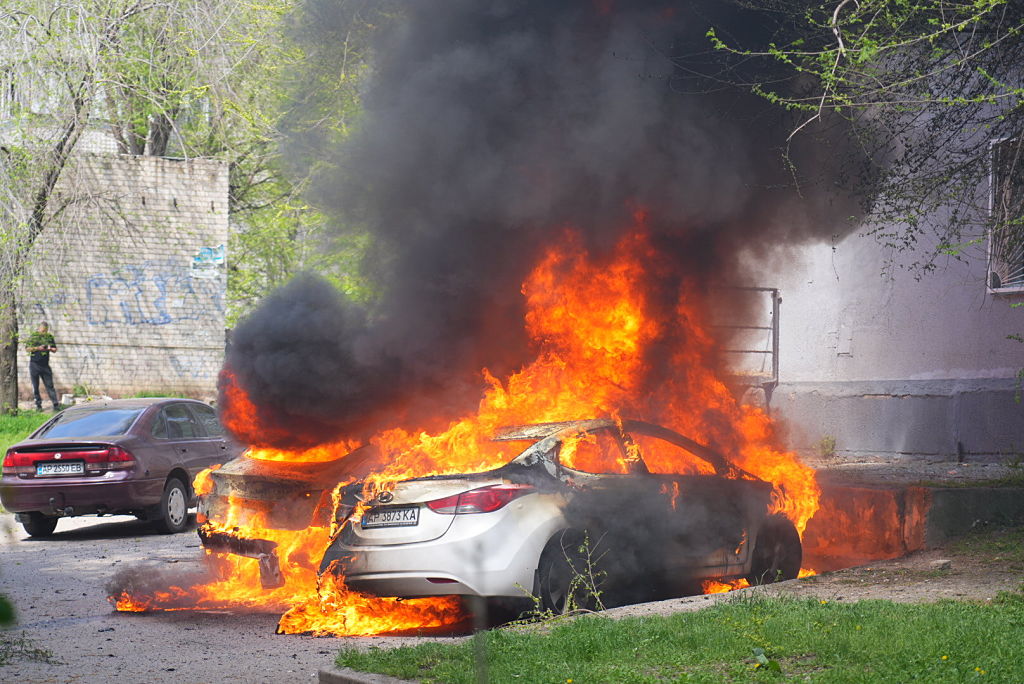
A view of damage after a Russian guided aerial bomb hit a residential neighborhood in Zaporizhzhia. The Russian strike killed a 69-year-old woman and injured 38 others, including children. (Zaporizhzhia Regional Military Administration/Handout/Anadolu via Getty Images)
Putin’s Peace Mirage: FT Reports Russia Willing to Accept Current Front Lines
The Financial Times reported today that Russian President Vladimir Putin is willing to end the war in Ukraine along the current frontlines, a significant shift from Russia’s public demands. According to the report, Putin conveyed this offer to US Special Envoy Steve Witkoff during their April 11 meeting in St. Petersburg, potentially scaling back Russia’s territorial demands for the first time since 2022.
The Kremlin immediately cast doubt on the report. “A lot of fakes are being published now, including those published by respected publications, so one should only listen to primary sources,” said Kremlin spokesperson Dmitry Peskov.
The reported offer contrasts sharply with Russia’s public posture. Russian officials have repeatedly demanded that Ukraine cede all of Luhansk, Donetsk, Zaporizhzhia, and Kherson oblasts before agreeing to a ceasefire. Russian Foreign Minister Sergei Lavrov explicitly cited these demands on April 14, and Russian Foreign Intelligence Service Head Sergey Naryshkin emphasized on April 15 that any peace agreement must include recognition of Russia’s illegal annexation of these territories.
European officials briefed on the matter told the FT they believe Putin is using the offer to lure US President Donald Trump into accepting Russia’s other demands and force these onto Ukraine as a fait accompli. Those demands likely include Ukrainian neutrality, regime change, and demilitarization—Putin’s pre-war demands that Kremlin officials have consistently reiterated throughout the conflict.
Blame Game Intensifies: Kremlin Officials Deflect Responsibility for Ceasefire Impasse
Kremlin officials continued efforts on April 22 to blame Ukraine for the lack of progress toward President Volodymyr Zelensky’s proposed temporary ceasefire on strikes against civilian infrastructure, despite Zelensky’s clear willingness to negotiate.
Zelensky reiterated on April 21 that Ukraine remains ready to discuss his proposal for a 30-day ceasefire on long-range strikes against civilian infrastructure. Yet Kremlin Spokesperson Dmitry Peskov claimed today that Ukraine has yet to respond to Putin’s repeated statements signaling Russia’s willingness to discuss such a ceasefire.
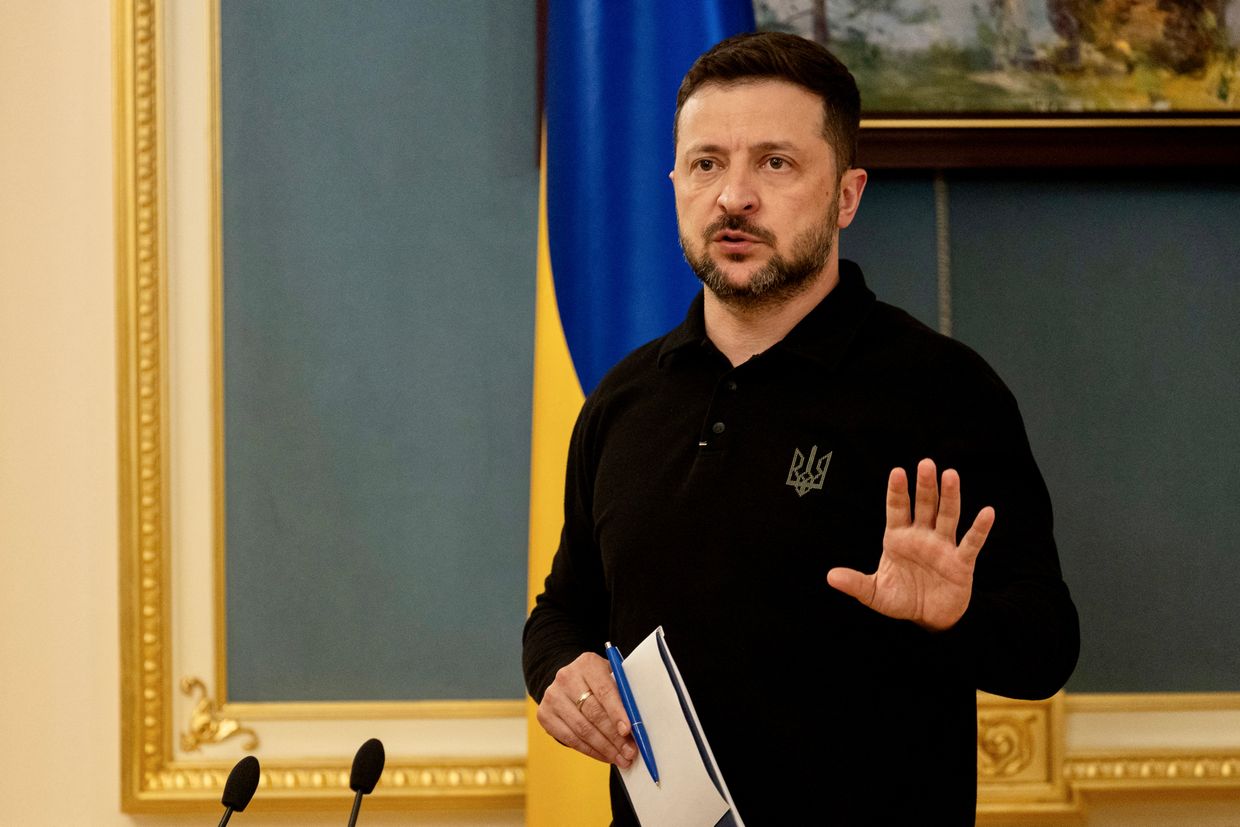
President Volodymyr Zelensky delivers a press conference in Kyiv, amid the Russian invasion of Ukraine. (Tetiana Dzhafarova / AFP)
“There are no plans to discuss the proposed ceasefire,” Peskov stated, adding that Ukraine must remove its “obstacles” to contacts with Russia before bilateral discussions can begin—referring to Zelensky’s September 2022 decree banning negotiations with Putin after Russia’s illegal annexation of Ukrainian territory.
Peskov reiterated Putin’s April 21 claims that Russia needs to “sort out” cases where there have been strikes against civilian infrastructure where military personnel were allegedly operating before agreeing to Zelensky’s proposal. This stance aligns with reporting that the Kremlin will attempt to blame Ukraine should ceasefire talks collapse.
Kremlin Rejects Trump’s Timeline for Peace: “Not Worth Setting Rigid Time Frames”
The Kremlin continued to reject US President Donald Trump’s stated goal of achieving a ceasefire in Ukraine before a full peace settlement—in stark contrast to Ukraine’s continued support for a general ceasefire.
Trump expressed hope on April 20 that Russia and Ukraine would make a deal this week. Zelensky stated on April 21 that a ceasefire “should be the first step towards a reliable and lasting peace” and that only after demonstrating adherence to an agreed-upon ceasefire can the parties establish the trust necessary to resolve “fundamental issues.”
Peskov poured cold water on these aspirations today, claiming that “it is probably not worth setting any strict time frames” or “trying to fit a viable settlement into a short time frame” as “the topic is so complex.” He acknowledged that Russia and the United States maintain communication via several channels but downplayed expectations for rapid progress.
These statements continue to demonstrate Ukraine’s willingness to adhere to Trump’s preferred approach and Russia’s rejection of it.
Death From Above: Russian Strikes Kill and Injure Dozens Across Ukraine
Russia launched deadly strikes against multiple Ukrainian cities today, claiming civilian lives even as peace talks are set to resume in London tomorrow.
In Zaporizhzhia, Russian forces attacked the city with two guided bombs, killing at least one person and injuring 38 others, including five children. One bomb hit an infrastructure facility, while another struck a multi-story residential building in a residential neighborhood. Thirteen victims were hospitalized, including the children.
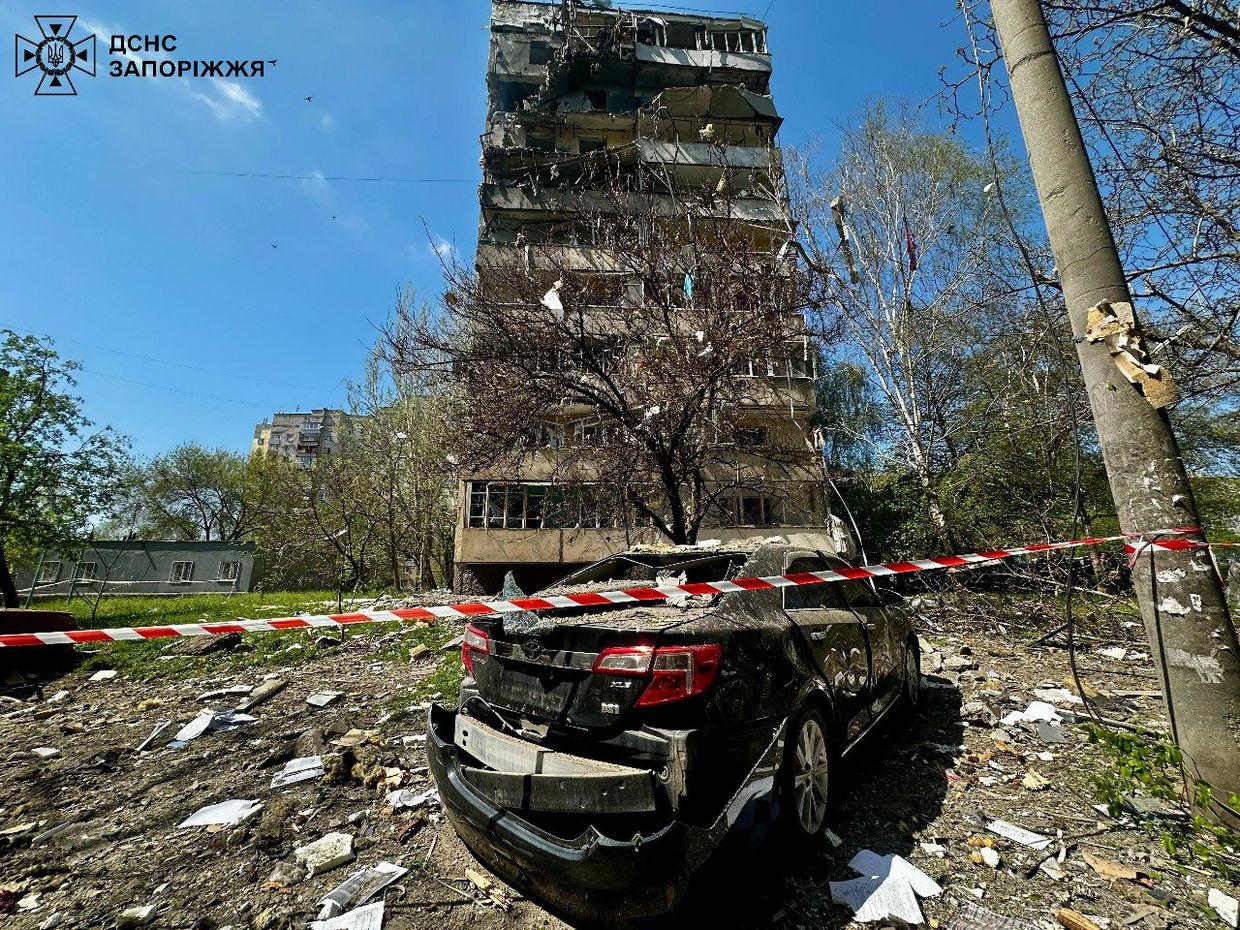
A residential building damaged in a Russian airstrike against Zaporizhzhia, Ukraine (State Emergency Service)
In Kherson, a Russian drone struck a funeral procession in the city center, injuring six people, including four funeral service employees and two hospital staff members. The attack damaged both the hospital building and service vehicles.
Russian forces also targeted Kharkiv, striking four municipal districts in an attack lasting less than an hour, injuring seven people. In Kupiansk, a front-line town in Kharkiv Oblast, a Russian airstrike injured another seven people and damaged 55 houses.
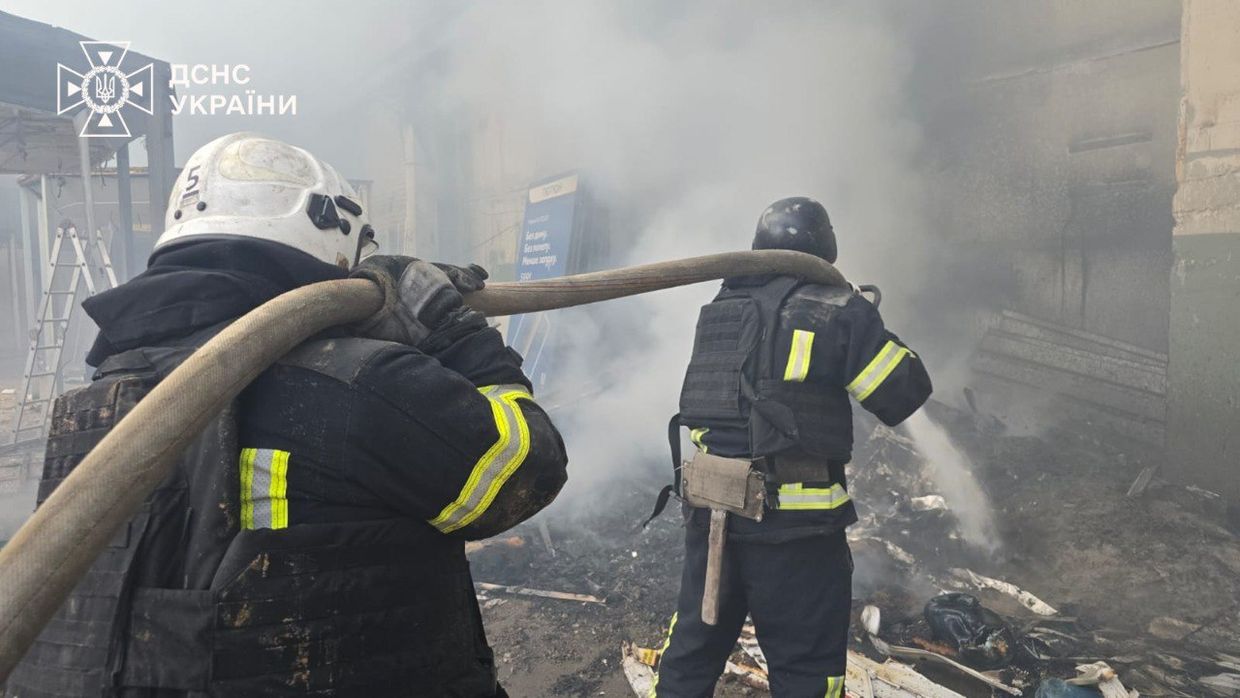
The aftermath of Russian drone attacks against Kharkiv, Ukraine. (State Emergency Service)
Russian drone strikes overnight targeted Odesa, injuring three people. In Dnipropetrovsk Oblast, a 66-year-old man and a 63-year-old woman were injured in the Nikopol district after Russian forces attacked several settlements with artillery and drones.
In Sumy Oblast, Russian forces used aerial bombs against the Bilopillia community, injuring one person. In Donetsk Oblast, one person was injured in an attack against the town of Myrnohrad.
According to Ukraine’s Air Force, Russian forces launched 54 drones overnight from launch sites in Russia and occupied Crimea. Ukrainian forces shot down 38 drones, while 16 more disappeared from radars without causing damage, likely decoys designed to overwhelm Ukrainian air defenses.
New Drone Tactics: Russia Innovates to Overwhelm Ukrainian Air Defenses
Russian forces are continuing to innovate their long-range drone strike tactics to counter the effectiveness of Ukrainian mobile air defense units, according to reports from Russian military bloggers.
These sources claimed today that Russian forces conducted a strike against Odesa City on April 21 with Geran-3 jet kamikaze drones, Russia’s analogue to the Iranian Shahed-238, which reportedly has a maximum speed of 500 to 600 kilometers per hour.
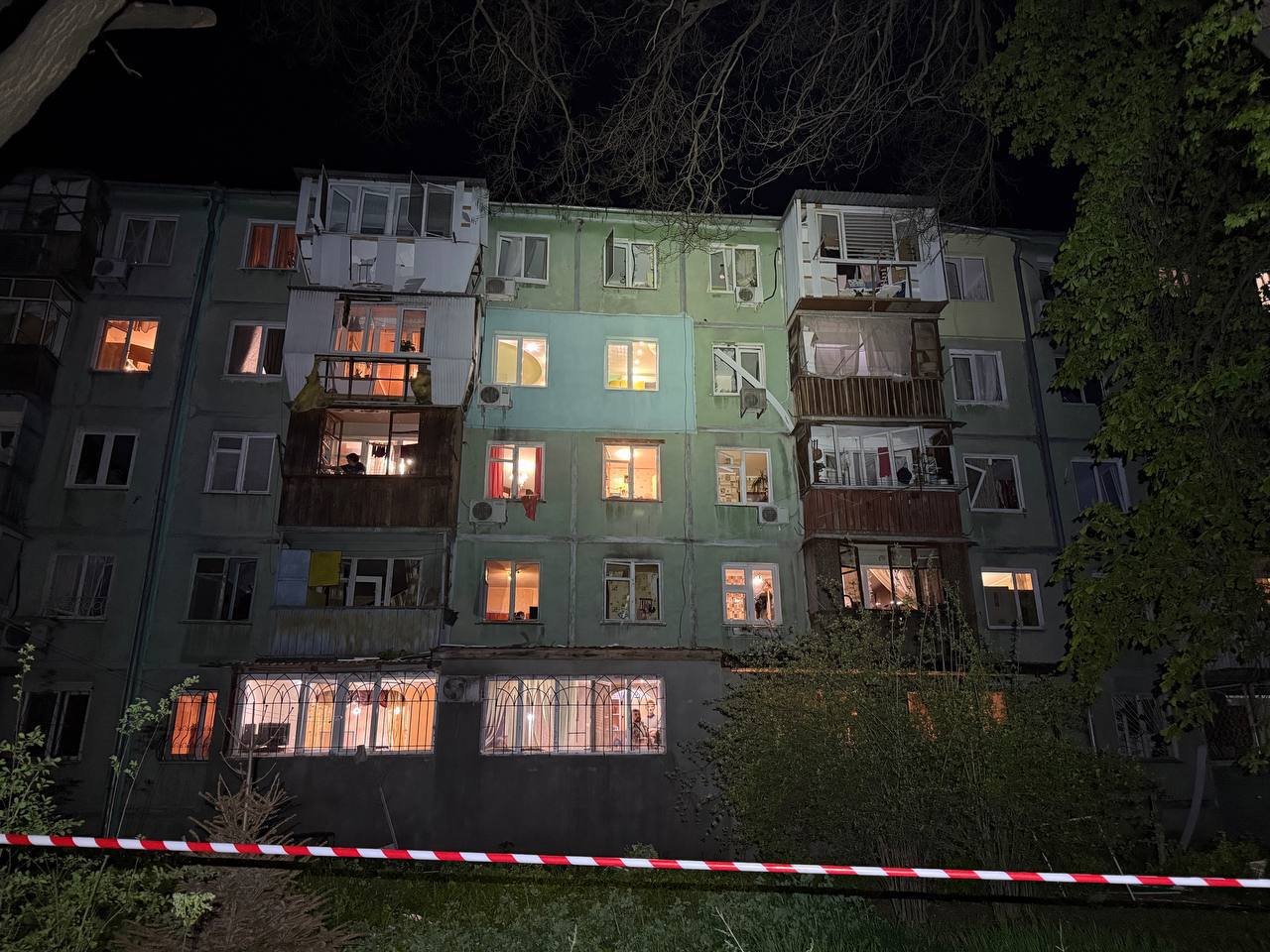
The aftermath of the Russian drone strike against the regional center of Odesa, Ukraine, overnight. (Hennadii Trukhanov / Telegram)
One military blogger claimed that the Geran-3 drone may have a new compact turbojet engine or a modified version of the previous engine. Others noted that the drones flew at higher altitudes than previous models during the Odesa strike, allowing them to avoid Ukrainian mobile defense units.
The bloggers described a sophisticated attack pattern where Russian forces directed multiple drones from different directions toward a single target. The drones reportedly waited in a designated area near the target while others conducted reconnaissance for target adjustment. They then executed a concentrated, simultaneous strike from different directions to overwhelm defenses.
Ukrainian Center for Countering Disinformation Head Lieutenant Andriy Kovalenko confirmed today that Russia has recently increased its production of Geran-type drones and begun using swarm tactics during strikes. Ukrainian forces have proven highly effective at shooting down Russia’s long-range drones using mobile units, and Russia is likely seeking to overcome these defenders by increasing drone numbers, implementing swarm strikes, and adapting drones to penetrate Ukraine’s air defenses.
North Korean Workers in Russia: Moscow Recruits Foreign Labor to Offset Shortages
Russia is reportedly recruiting North Korean citizens to compensate for labor shortages, indicating deepening cooperation between Moscow and Pyongyang.
According to Russian regional news outlets and opposition media, North Korean women have been recruited to work at warehouses of Russian retail giant Wildberries in Ryazan and Moscow oblasts. While Wildberries has not confirmed hiring North Korean nationals specifically, a company representative stated they are working with a recruiting agency to attract workers from unspecified countries.
Russian military bloggers amplified this reporting today, praising Russia’s and Wildberries’ efforts to recruit North Korean workers. They described North Korean migrants as preferable to those from Central Asian countries, claiming they only work on short-term contracts rather than migrating permanently, are more “disciplined,” work harder for less pay, have fewer biases against Russia, and “behave decently”—reflecting Russian ultranationalist and xenophobic attitudes toward Central Asian communities.
Russian official data shows that 13,221 North Koreans entered Russia in 2024—up to 12 times the number that entered in 2023—with 7,887 entering on student visas. The largest influx occurred in the months immediately preceding the deployment of North Korean troops to Russia.
A significant increase in North Korean civilian sector workers could free up Russian employees to work in the defense industry or join the fight against Ukraine, further enhancing Russia’s war effort.
Vladimir Arsenal Explosion: Massive Detonation at Key Russian Weapons Depot
Explosions erupted today at one of Russia’s largest weapons arsenals in Vladimir Oblast, causing a fire and prompting evacuations in nearby settlements.
The facility in question is Russia’s 51st Arsenal of the Main Missile and Artillery Directorate, located about 530 kilometers from the Ukrainian border. Ukrainian Center for Countering Disinformation Head Lieutenant Andriy Kovalenko, who typically reports on successful Ukrainian strikes against Russian territory, stated that the arsenal stored approximately 105,000 tons of weapons, including significant stocks of artillery shells, missiles, and ammunition for air defense systems and multiple launch rocket systems.
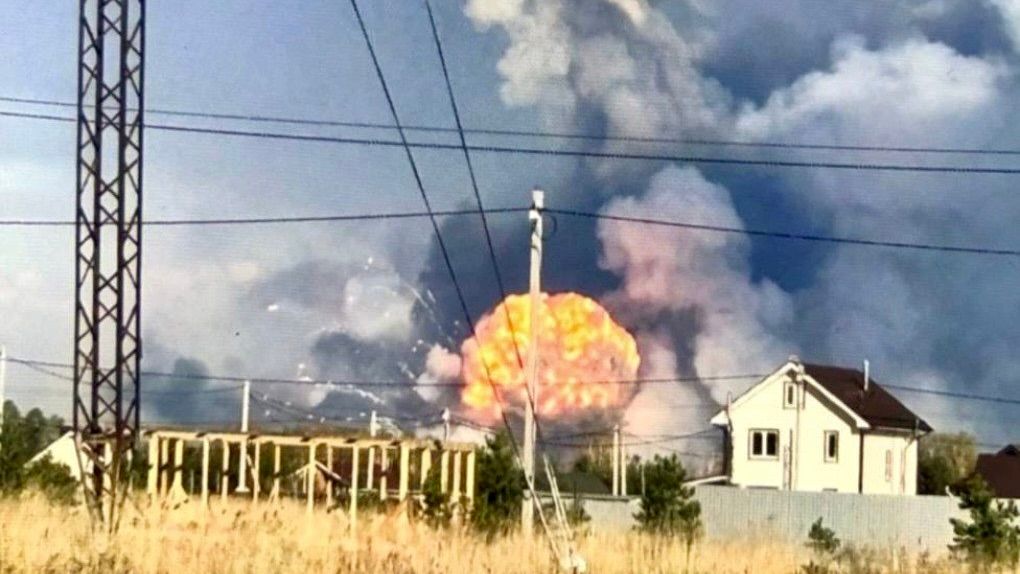
Smoke rises over the site of reported explosions at a Russian weapons arsenal in Vladimir Oblast. (Astra / Telegram)
Kovalenko did not specify the cause of the explosion. Geolocated footage published today shows a smoke plume southwest of Kirzhach near the 51st Arsenal. Vladimir Oblast Governor Aleksander Avdeeva confirmed an explosion in Kirzhachsky Raion. Four people were reportedly injured.
The Russian Ministry of Defense claimed that a fire at an unspecified military unit in Vladimir Oblast caused an ammunition warehouse to detonate and that safety regulation violations regarding the handling of explosive materials caused the fire. Russian military bloggers speculated that Ukrainian drones may have caused the explosion if they hit open or poorly protected areas of the arsenal, while others suggested human error or sabotage.
Russia Advances in Kursk Oblast, Toretsk Front
Russian forces recently advanced in Kursk Oblast and near Toretsk in Donetsk Oblast, according to geolocated footage.
In Kursk Oblast, footage published today showed that Russian forces recently advanced along the 38H-609 Sudzha-Guyevo highway south of Oleshnya. Russian sources claimed that Russian forces seized the St. Nicholas Monastery southwest of Guyevo after Ukrainian forces allegedly used the April 19-20 Easter truce to regain positions in the monastery.
Meanwhile, geolocated footage posted today indicates that Russian forces recently made marginal gains in the waste heap area immediately north of Toretsk. The Russian Ministry of Defense and other Russian sources claimed that Russian forces seized Sukha Balka, southwest of Toretsk, though this claim remains unconfirmed.
Fighting continued across multiple fronts, with neither side making significant territorial gains. Ukrainian forces continued to defend against Russian attacks in northern Sumy Oblast, northern Kharkiv Oblast, the Kupyansk direction, the Borova direction, the Lyman direction, the Siversk direction, the Chasiv Yar direction, the Pokrovsk direction, the Novopavlivka direction, the Kurakhove direction, the Velyka Novosilka direction, western Zaporizhia Oblast, and the Dnipro direction.
Diplomatic Chess: Key US Officials Skip London Talks as Witkoff Heads to Moscow
In a significant diplomatic development, US Secretary of State Marco Rubio and Special Envoy Steve Witkoff will not attend tomorrow’s peace talks in London, multiple sources confirmed today. The US will instead be represented by Special Envoy to Ukraine Keith Kellogg at the meeting with Ukrainian, British, and French officials.
Meanwhile, Russian presidential aide Yuri Ushakov announced that Witkoff is expected to visit Moscow later this week, which would mark his fourth trip to Russia this year. White House Press Secretary Karoline Leavitt confirmed that Witkoff will travel to Russia “later this week to continue talks with Russian President Vladimir Putin.”
This diplomatic reshuffling comes as Ukraine faces mounting pressure to respond to a controversial US proposal reportedly including provisions for recognizing Russia’s 2014 annexation of Crimea and barring Kyiv from joining NATO. The proposal was presented during talks in Paris on April 17, and Ukraine is expected to deliver its formal response during tomorrow’s London meeting.
Witkoff, the Trump administration’s envoy to the Middle East who has emerged as a key figure in Russia-Ukraine negotiations, has drawn criticism from both US and Ukrainian officials for promoting Kremlin-aligned positions, including the idea of trading Ukrainian territory for peace.
Crimea Non-Negotiable: EU and Crimean Tatars Reject Russian Claims to Peninsula
The European Union will never recognize the Russian-occupied Crimean peninsula as legally Russian, the bloc’s top diplomat Kaja Kallas told Agence France-Presse today.
“Crimea is Ukraine,” Kallas stated firmly, adding that “it means a lot for the ones who are occupied that others don’t recognize this as Russian.” Her comments came in response to reports that the recognition of Crimea as Russian territory is being considered as part of a US-backed proposal to end the war in Ukraine.
Kallas said it would be a mistake to reward Moscow’s land grab by including recognition of Crimea as part of a ceasefire deal. “Then Russia clearly gets what they want,” she said. She emphasized that Washington should instead look to mount pressure on Moscow rather than ceding to Kremlin demands. “They have tools in their hands to use, actually, to pressure Russia. They haven’t used those tools,” she stated.
In a parallel development, the Mejlis, the representative body of the Crimean Tatar people, declared today that it will reject any international recognition of Russian-occupied Crimea as Russian territory. Mejlis chairman Refat Chubarov stated that the body’s stance is grounded in international law and aligns fully with Ukrainian legislation.
“Crimea is the homeland of the indigenous Crimean Tatar people and an integral part of Ukraine. Accordingly, no one can decide the fate of Crimea under any circumstances, except for the Ukrainian state and the Crimean Tatar people,” Chubarov wrote.
Ukraine Confronts China: Evidence Presented of Chinese Citizens in War
Ukraine has presented Beijing with evidence that Chinese citizens and companies have participated in Russia’s full-scale war against Ukraine, the Foreign Ministry reported today.
During a meeting with Chinese Ambassador to Ukraine Ma Shengkun, Deputy Foreign Minister Yevgen Perebyinis shared evidence that Chinese citizens and companies are involved in the war in Ukraine, citing participation of Chinese nationals in combat alongside Russian troops and Chinese businesses’ role in producing military equipment for Russia.
These matters “are of serious concern and contradict the spirit of partnership between Ukraine and the People’s Republic of China,” the ministry said. Ukrainian special services shared evidence of the allegations with the Chinese, according to the ministry.
Perebyinis called for China to “take measures to stop supporting Russia” in its aggression against Ukraine, and assured that Ukraine “values its strategic partnership with China and expects that China will refrain from taking steps that could hinder bilateral relations.”
The report comes less than a week after President Zelensky announced that China is supplying weapons to the Russian military. The Chinese Foreign Ministry rejected Zelensky’s claims on April 18 as “groundless,” insisting that Beijing remains committed to a ceasefire.
UN Confirms: Easter Truce Failed as Both Sides Continued Fighting
Russia’s declared Easter truce failed to hold as both sides continued fighting, Stephane Dujarric, a spokesperson for the UN Secretary-General, said today during a press briefing.
“Both sides continued to fight. Once again, we call to end this war in line with relevant UN resolutions, international law, and the territorial integrity of Ukraine,” Dujarric stated.
Russia announced a symbolic one-day ceasefire on April 19, which President Zelensky said was violated around 3,000 times. Moscow also accused Kyiv of violating the truce, while Ukraine maintained it would carry out military actions only in a “symmetrical” response to Russian attacks during the ceasefire.
Following the Easter truce, Zelensky proposed a broader 30-day ceasefire on long-range missile and drone strikes against civilian infrastructure. While claiming openness to “peace initiatives,” Russia has not yet agreed to impose this ban, with Zelensky saying on April 21 that he was still waiting for an answer.
Russian “Charm Offensive”: French Foreign Minister Calls Easter Truce a PR Move
Russian President Vladimir Putin’s Easter truce was a “marketing operation” aimed at appeasing US President Donald Trump, French Foreign Minister Jean-Noel Barrot told FranceInfo today.
“The Easter truce that Putin announced somewhat unexpectedly was more of a PR move—a charm offensive intended to prevent President Trump from becoming impatient or upset,” Barrot said.
The Trump administration has grown increasingly impatient with its stalled efforts to broker a ceasefire between Ukraine and Russia. The US president has even said he would abandon the effort unless there is tangible progress, though he later voiced optimism that a deal could be reached.
Barrot added that “The US encouraged Kyiv to go further by suggesting a full 30-day ceasefire. Ukraine accepted, and now it’s up to Putin to accept the same principle.” He noted that European leaders outlined their “red lines” in a peace deal during talks in Paris on April 17, but did not elaborate on the specifics.
Hybrid Warfare Escalates: Russia Targets Netherlands with Cyberattacks
Russia is stepping up its hybrid attacks aimed at the Netherlands and its European allies, the Dutch military intelligence agency MIVD said today in its annual report.
“We see that the Russian threat against Europe is increasing, including after a possible end of the war against Ukraine,” MIVD director Peter Reesink stated, adding that Russian hackers have targeted a Dutch public service for the first time.
“In the Netherlands, we saw the first Russian cyberattack against a public service, which was designed to take over the system. The attack was thwarted, but it was the first such case,” he said.
The Dutch Interior Ministry detected a Russian cyberattack on the public service’s digital operating system last year and reported a Russian cyber operation against critical infrastructure in the Netherlands, possibly in preparation for sabotage.
Dutch authorities described Russian interference as a combination of traditional espionage, cyberattacks, and other attempts to influence society. The government also reiterated warnings about Russian entities mapping infrastructure in the North Sea and potential acts of sabotage aimed at Internet cables, water, and energy supplies.
India’s Russian Oil Imports Surge to Two-Year High Despite Sanctions
India’s imports of Russian crude are likely to hit 2.15 million barrels per day in April, the highest volumes since May 2023, Bloomberg reported today, citing Kpler data.
Russian oil shipments appear to be picking up pace again after months of disruptions caused by U.S. sanctions on Russia’s fossil fuel exports. India, the world’s third-largest oil importer, has become the leading buyer of Russian oil products, which it purchases at a discount amid sanctions that largely cut Moscow off from the Western market.
Russia has remained the South Asian country’s leading supplier for the third year in a row, according to Reuters. The Indian market was rattled earlier this year after sweeping U.S. sanctions in January that targeted Russia’s “shadow fleet,” major oil companies, and associated entities, significantly complicating Moscow’s crude exports.
Despite a temporary drop, Indian imports of Russian crude began climbing again in March. New Delhi has maintained a neutral stance on the Russia-Ukraine war, calling for a peaceful solution while fostering economic relationships with Moscow.
Diplomatic Moves: Switzerland Sanctions Russian Media, Japan Shares Intel with Ukraine
Switzerland will join the European Union in sanctioning eight Russian state media outlets, the Swiss Economic Ministry announced today. The sanctions will come into force tomorrow, breaking with Switzerland’s historically neutral position.
The February EU sanctions targeted eight Russian outlets accused of spreading propaganda: Eurasia Daily, Fondsk, Lenta, NewsFront, RuBaltic, SouthFront, Strategic Culture Foundation, and Krasnaya Zvezda.
While Switzerland’s longstanding policy of neutrality still prevents it from supplying Kyiv with military aid, the country has provided Ukraine with billions in economic and humanitarian support.
In another significant development, Japan’s Kyushu University Institute for Q-shu Pioneers of Space has reportedly agreed to provide Ukraine’s military intelligence agency with synthetic aperture radar imagery, according to Intelligence Online magazine.
Japanese and Ukrainian authorities began discussing possible support in February, with the talks gaining urgency after the US temporarily paused intelligence assistance for Kyiv in early March. The SAR technology, which can recreate two-dimensional or three-dimensional images of landscapes or objects regardless of weather conditions, has broad military applications for tracking enemy movement and installations.
Zelensky to Attend Pope Francis’s Funeral in Vatican
President Volodymyr Zelensky intends to attend Pope Francis’s funeral in the Vatican, presidential advisor Dmytro Lytvyn told journalists today, according to Interfax-Ukraine.
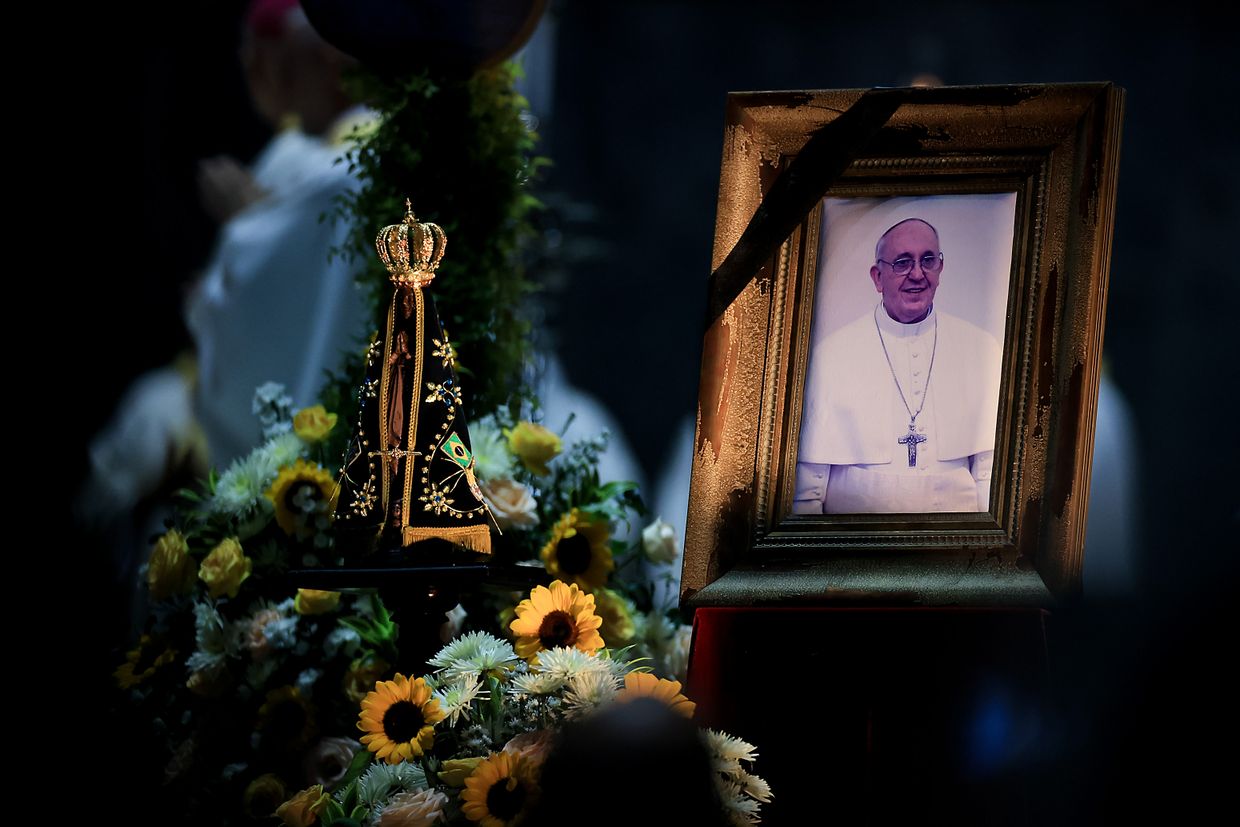
A portrait of the late Pope Francis is displayed during a mass in his honor at the Rio de Janeiro Metropolitan Cathedral, in Rio de Janeiro, Brazil. (Buda Mendes/Getty Images)
“A visit by the president and the first lady (Olena Zelenska) is planned,” Lytvyn said. The Vatican confirmed that the funeral will be held at 10 a.m. local time on April 26. The ceremony will take place on St. Peter’s Square, and Pope Francis will be buried at the Basilica of St. Mary Major in Rome.
U.S. President Donald Trump and First Lady Melania Trump have confirmed their attendance at the ceremony, marking their first international trip during Trump’s second term. French President Emmanuel Macron also said he would arrive for the funeral.
Pope Francis died in his residence in Vatican City on Easter Monday, April 21, after a stroke and a cardiac arrest. The first Latin American pope was 88 years old at the time of his death and had led the Catholic Church since 2013.
US Court Intervenes: Judge Orders Restoration of Voice of America
A US federal judge today ordered the Trump administration to restore all employees and contractors at Voice of America, saying the administration’s efforts to dismantle the outlet likely violated US law.
US District Judge Royce Lamberth granted the plaintiffs a preliminary injunction and ordered the administration to restore all employees and contractors to their news programs. The decision comes less than a month after a court issued a restraining order to prevent the mass firing of some 1,300 VoA employees.
“(The administration) took immediate and drastic action to slash USAGM… without regard to the harm inflicted on employees, contractors, journalists, and media consumers around the world,” Lamberth said. “It is hard to fathom a more straightforward display of arbitrary and capricious actions than the Defendants’ actions here.”
As part of his administration’s wide-reaching funding cuts, President Trump has tried to gut the US Agency for Global Media, which oversees Voice of America, Radio Free Europe/Radio Liberty, and Radio Free Asia. Trump has denounced the outlet as “radical propaganda” and issued an executive order on March 14 slashing funding for USAGM.
Looking Ahead: The Narrow Path to Peace
As diplomatic efforts intensify and negotiators prepare for critical talks in London, the gap between rhetoric and reality on the ground remains vast. Russia’s continued strikes on civilian targets, battlefield advances, hybrid warfare against European allies, and mixed diplomatic signals underscore the challenges of reaching even a temporary ceasefire, let alone a comprehensive peace agreement.
The contradictory narratives emerging from Moscow—private offers to accept current front lines while publicly demanding full territorial surrender—reveal a Kremlin strategy aimed at extracting maximum concessions while maintaining military pressure. Ukraine’s consistent willingness to engage in ceasefire discussions stands in stark contrast to Russia’s shifting positions and continued aggression.
With US patience potentially wearing thin and European allies increasingly concerned about being sidelined in negotiations, the coming days will be crucial in determining whether diplomatic initiatives can translate into meaningful steps toward peace. For now, as civilians in Zaporizhzhia, Kharkiv, and Kherson can attest, the deadly reality of war continues across Ukraine.
